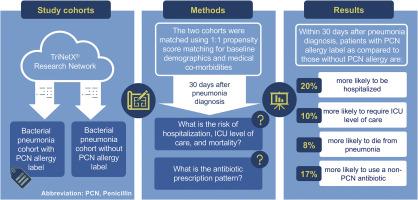The Journal of Allergy and Clinical Immunology: In Practice ( IF 8.2 ) Pub Date : 2022-09-28 , DOI: 10.1016/j.jaip.2022.08.027 Lauren W Kaminsky 1 , Aria Ghahramani 2 , Rezhan Hussein 3 , Taha Al-Shaikhly 1

|
Background
Penicillins (PCNs) are a first-line treatment option for bacterial pneumonia. PCN allergy label can delay antimicrobial treatment and result in the use of alternative antibiotic regimens risking an inadequate response to treatment and potentially increased adverse drug reactions.
Objective
To investigate the impact of PCN allergy label on clinical outcomes of bacterial pneumonia.
Methods
This retrospective cohort study used TriNetX, a web-based tool for population cohort research, to identify adult patients with and without PCN allergy label diagnosed with bacterial pneumonia. Cohorts were matched for baseline demographics and chronic medical conditions. The 30-day risks of hospitalization, acute respiratory failure, intubation, need for intensive level of care, and mortality were compared. Antibiotics used and their possible adverse reactions were explored.
Results
After matching, there were 68,748 patients in each cohort. Patients with bacterial pneumonia with PCN allergy label had higher risks of hospitalization (risk ratio [RR], 1.23; 95% confidence interval [CI], 1.22-1.24), acute respiratory failure (RR, 1.14; 95% CI, 1.12-1.15), intubation (RR, 1.18; 95% CI, 1.13-1.22), intensive level of care (RR, 1.11; 95% CI, 1.08-1.14), and mortality (RR, 1.08; 95% CI, 1.04-1.13) compared with patients without PCN allergy label. Patients with PCN allergy label had decreased use of PCNs and cephalosporins and increased utilization of other antibiotic classes compared with patients without PCN allergy label. PCN allergy label was also associated with increased risk of adverse drug reactions.
Conclusion
PCN allergy label is associated with worse clinical outcomes in bacterial pneumonia, and risk mitigation strategies should be considered.
中文翻译:

青霉素过敏标签与细菌性肺炎更糟糕的临床结果相关
背景
青霉素 (PCN) 是细菌性肺炎的一线治疗选择。 PCN 过敏标签可能会延迟抗菌治疗,并导致使用替代抗生素治疗方案,从而导致治疗反应不足,并可能增加药物不良反应。
客观的
探讨 PCN 过敏标签对细菌性肺炎临床结果的影响。
方法
这项回顾性队列研究使用 TriNetX(一种基于网络的人群队列研究工具)来识别诊断为细菌性肺炎的有或没有 PCN 过敏标签的成年患者。队列的基线人口统计数据和慢性病状况相匹配。比较了住院、急性呼吸衰竭、插管、重症监护需求和死亡率的 30 天风险。探讨了所使用的抗生素及其可能的不良反应。
结果
匹配后,每个队列中有 68,748 名患者。具有 PCN 过敏标签的细菌性肺炎患者住院风险较高(风险比 [RR],1.23;95% 置信区间 [CI],1.22-1.24)、急性呼吸衰竭(RR,1.14;95% CI,1.12-1.15) )、插管(RR,1.18;95% CI,1.13-1.22)、重症监护(RR,1.11;95% CI,1.08-1.14)和死亡率(RR,1.08;95% CI,1.04-1.13)与没有 PCN 过敏标签的患者进行比较。与没有 PCN 过敏标签的患者相比,有 PCN 过敏标签的患者减少了 PCN 和头孢菌素的使用,增加了其他抗生素类别的使用。 PCN 过敏标签也与药物不良反应风险增加相关。
结论
PCN 过敏标签与细菌性肺炎的较差临床结果相关,应考虑风险缓解策略。











































 京公网安备 11010802027423号
京公网安备 11010802027423号